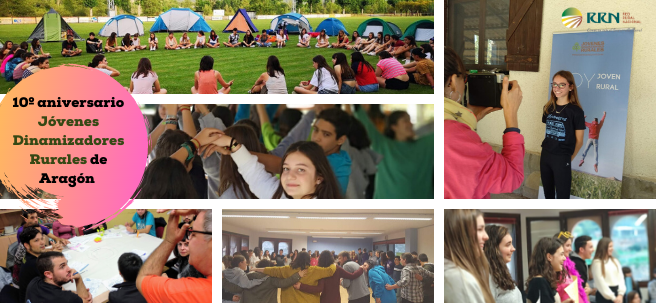
01 de July de 2020
The "Young Rural Dynamizers" (JDR) cooperation project is celebrating its tenth anniversary, brimming with projects. In addition to its original activity of rural revitalization through youth-led initiatives, it is now also launching a new project sponsoring entrepreneurship studies for "young people who are not so young anymore."
- The "Young Rural Promoters" of Aragon celebrate 10 years of activity, and to celebrate, they grant an interview to the National Rural Network through its coordinator, Sara Cortés.
 |
The JDR project was launched in 2010 through LEADER funding (and with the support of the EDP Foundation ) and is comprised of 13 Local Action Groups and 17 Aragonese regions. The work of these regions is essential for reaching rural youth aged 14-15. JDR's mission is to revitalize rural areas through initiatives proposed by young people aged 14-35.
Sara Cortés , project coordinator, explains her work to us.
RRN: What is the difficulty of working with rural youth?
Sara Cortés: The hardest part is locating young people at certain ages. But once you reach them, the JDR process is entirely assembly-based, and proposals are made through games. Obviously, we focus on whatever is most feasible for rural development. If they ask for a discotheque in a town, we don't grant it, but we do organize several artistic and cultural weekends in the regions of Aragon.
RRN: What reality do rural youth face?
SC: Our goal is to provide support for teenagers who have concerns that differ from what they see around them. When you're young and live in a small town, you may feel like an "oddball" for thinking differently than everyone else. Typically, if you want to start a business, your parents will prefer you do something more conservative and study, or take exams, or do what your family has traditionally done. In those cases of concerns, JDR exists to provide support.
RRN: And what happens in those cases where socially you stop being young?
SC: In rural areas, this sometimes happens when you turn 20. To meet these demands, we created "La era rural." We chose this name because the era isn't just a temporary measure; in villages, it refers to a space in the house or even the village, like a kind of square, where residents gather to celebrate and to work. Both. And "La era rural" was created for young people over 20 who have rural socioeconomic initiatives in the Aragon area and want to carry them out.
RRN: What measures are being taken to support them from this launchpad?
SC: In our case, we provide the tools, and from there, they decide whether or not they want to continue their entrepreneurial journey. For example, we offer a completely free virtual platform where each entrepreneur can host their project's website. This way, they have a completely free website for their business. It also serves as an umbrella for all of them to be united under a single brand in the Aragon region, making them easier to locate. We also provide in-person advice on tax, legal, and other matters.
RRN: What is your opinion of the current situation in rural areas?
SC: Very positive. People in rural areas have very good ideas. And they're also doing a lot of entrepreneurial work. And, above all, the rural environment offers numerous possibilities. A lot of wealth. For example, one of the projects promoted by "La era rural"—La Jardinera —brought together two young women who aim to recover traditional plants that were once cultivated in villages and, through this cultivation, make the products that were once made and used with them.











